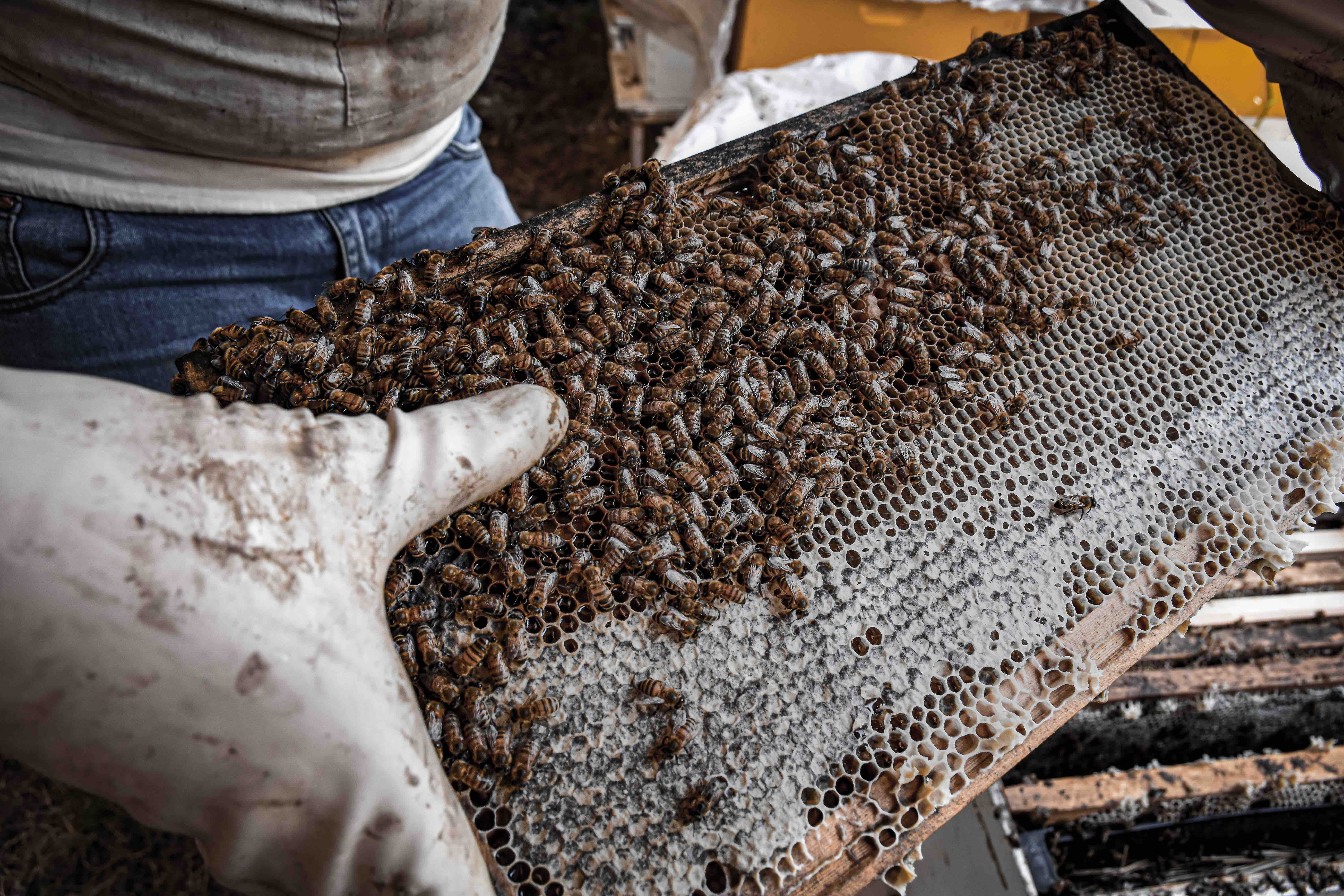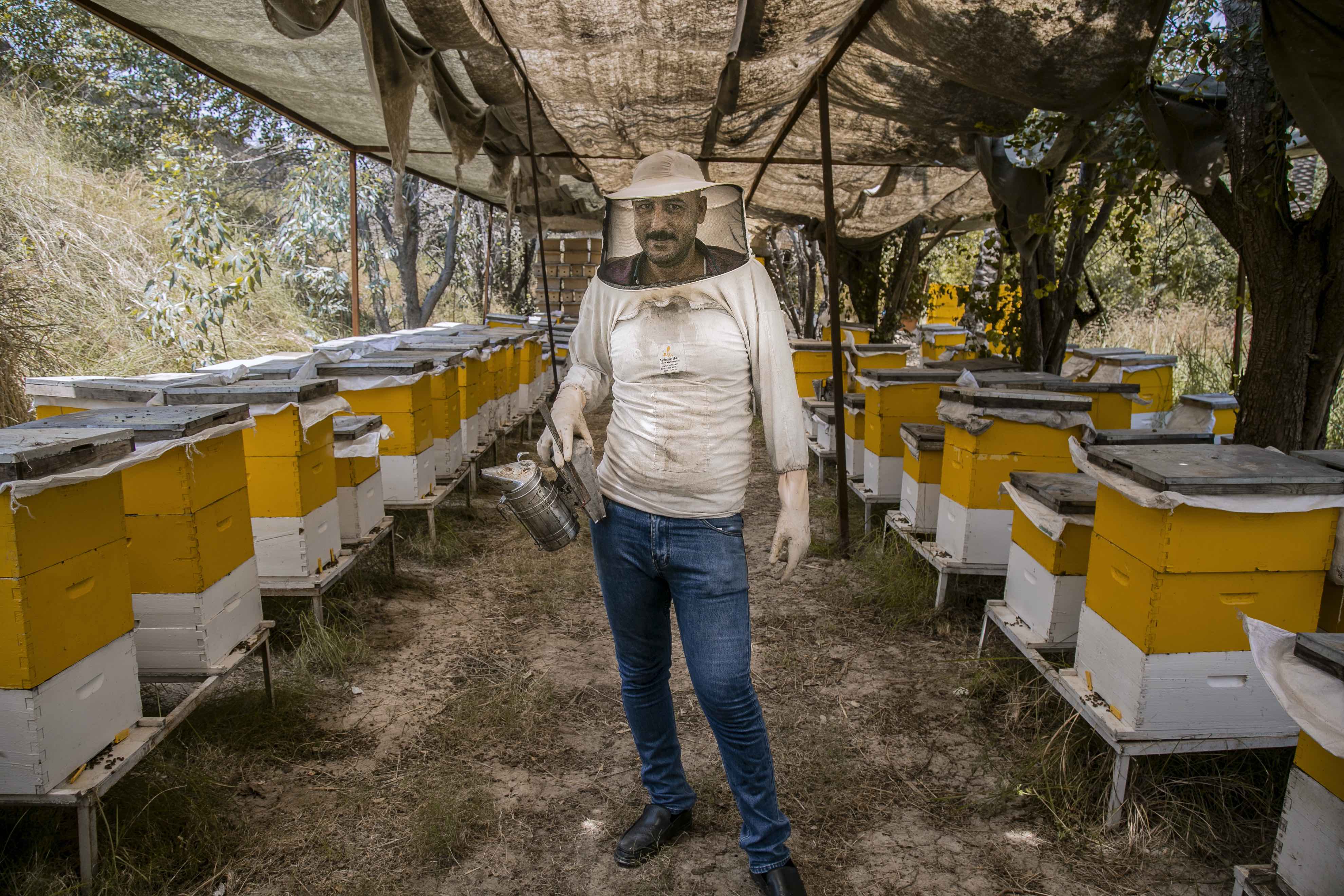This year, the bees in Mada’en, Baghdad, are exceptionally aggressive and attack without much provocation.
That’s according to Abdulqadir, 32, who started a beekeeping business in the Iraqi capital a year and a half ago. Already, he sounds like an expert.
“It is important for bees to be in an agricultural area in order to survive, and to achieve better quality of honey,” he added. “I harvest honey four times per year, once during winter — because the bees go into hibernation — [and] three times during the active season,” he added.

Abdulqadir harvests honey four times per year. Rafal Abdulateef/IOM Iraq, June 2019
Mada'en is covered in palm groves that makes it suitable for the beekeeping business. Rafal Abdulateef/IOM Iraq, June 2019
Abdulqadir started his beekeeping business with 20 beehives in early 2018 with support from the International Organization for Migration (IOM). Prior to the launch, he went through a two-month beekeeping vocational training with IOM as part of the reintegration package he received after returning voluntarily from Germany.
Abdulqadir checks on his beehives everyday. Rafal Abdulateef/IOM Iraq, June 2019
Photo: Raber Aziz/IOM Iraq, June 2019
Abdulqadir, married with two kids, originally left Mada’en in August 2015, hoping to find a better life in Europe. In 2008, he was shot several times by terrorists in his hometown. Some of his wounds healed, but for years he commuted between Mada’en and Baghdad for treatment on one wound in his left toe that couldn’t be patched up.
Abdulqadir with his children; Murouj (left) and Idrees. Rafal Abdulateef/IOM Iraq, June 2019
“The toe was deformed due to the bullet wound and every three months I had to go to hospital to remove the nail because it hurt so much as the nail grew out of flesh,” Abdulqadir explained.
His journey to Europe was long and arduous. He traveled to Turkey first where he paid a smuggler to get him to Greece from there. After a perilous 21-day journey including travel by sea, treks through dense forests, hitchhiking on buses and trucks across the borders of Macedonia, Croatia and Austria and spending the thousands of dollars he had put together from selling his taxi and other household items, Abdulqadir finally made it to Germany.
“The most dangerous part of the journey was the sea. It [takes] only one hour to cross from Turkey to Greece but it felt so long, like a never-ending journey, because we were on this inflatable boat in such high waves. It was terrifying,” he recounted.
Despite the sacrifices he made to reach German soil, three months of life in a camp there made him realize that he did not fit in.
“People have a very different lifestyle there that does not go with our own culture. And I missed my family back in Iraq who were in critical conditions,” Abdulqadir said. “I had already gone through one hearing for my asylum application but did not wait for a second hearing, and decided to voluntarily come home.”
He did, however, get the chance to see a doctor about his toe while in Germany. “They took out the toe nail completely. It is gone forever and I will never have a nail on my toe again, but the pain is gone forever which is very good,” he explained.
In February 2016, Abdulqadir bought a ticket and boarded a plane to Erbil, from where he travelled to Baghdad by land. Upon arrival, a friend referred him to IOM for support and he was immediately enrolled in the beekeeping vocational training. In 2018, IOM supported Abdulqadir with a small grant to open his beekeeping business.
Abdulqadir's beehives have increased from 20 to 30 in a year and a half. Raber Aziz/IOM Iraq, June 1019
Up from the original 20 hives he now has 30, and gets around 150 kilograms of pure honey from every harvest.
An agent collects the honey from him, which ends up in the local markets including Sama Mall and the Mansour, Karkh and Rasafa marketplaces in Baghdad. Customers come from as far as Najaf and Karbala governorates in south-central Iraq to buy honey from him wholesale.
Everytime Abdulqadir harvest honey he collects 150 kilograms of pure honey. Raber Aziz/IOM Iraq, June 2019
“I really enjoy doing this, it has had a positive impact on my mental and psychological state. When you sit at home with nothing to do, you get depressed. I feel like I have my own kingdom when I stand here in the middle of all these beehives,” he explained.
Photo: Rafal Abdulateef/IOM Iraq, July 2019
Photo: Raber Aziz/IOM Iraq, July 2019

Asked if he would try to migrate irregularly again, Abdulqadir replied. “I wouldn’t think of it anymore, but traveling? Yes, definitely.”
Since 2012, 24,942 Iraqis who returned from Germany and other European Union countries have benefited from IOM’s Assisted Voluntary Return and Reintegration services support that includes one or more of the following services: reception and in-kind assistance, case management, economic orientation and coaching sessions, vocational training, job placement as well as business support for creation and expansion of small and medium enterprises.
IOM’s assistance to Abdulqadir was funded by Germany's Federal Ministry for Economic Cooperation and Development (BMZ), through the German Corporation for International Development (GIZ) and the German Center for Jobs, Migration and Reintegration in Iraq (GMAC).
Photo: Rafal Abdulateef/IOM Iraq, July 2019
